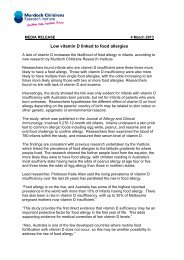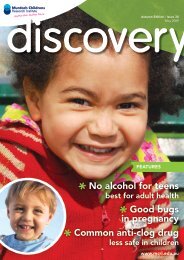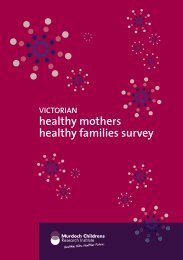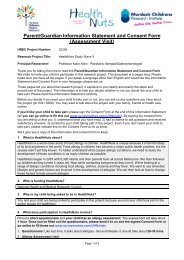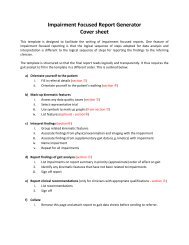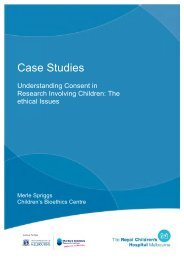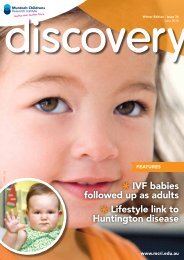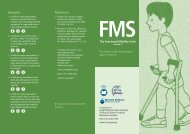Case studies: - Murdoch Childrens Research Institute
Case studies: - Murdoch Childrens Research Institute
Case studies: - Murdoch Childrens Research Institute
Create successful ePaper yourself
Turn your PDF publications into a flip-book with our unique Google optimized e-Paper software.
Questions:<br />
1. Rather than talking about the small risk of sudden death, is it acceptable to<br />
describe the risks of participation as involving no more risk than what<br />
infants are exposed to if they were travelling on an aeroplane or taken on a<br />
holiday to an area of high altitude?<br />
Comments:<br />
Possible justifications for framing risk in terms of aeroplane travel and holidays in<br />
areas of high altitudes are: (a) to save parents from too much worry, and (b) to<br />
frame risk in a way that is easily understood.<br />
(a) is not an acceptable justification. Full disclosure of risks is necessary for parents<br />
to be able to make an informed decision about their child’s participation. In general<br />
(b) is a good thing, but in this case it may mislead in the sense that it may deflect<br />
consideration away from whether the risk is worth taking for this purpose (i.e.<br />
research). As Savulescu argues: “People judge that some risks are worth taking,<br />
but it is up to them to make that evaluation. Though driving a car or flying in an<br />
aeroplane does entail risk, it is wrong to assume that a person would take on this<br />
risk to participate in research.”<br />
One way of trying to think through this is to imagine yourself as a parent invited to<br />
consent for your child to take part in the research. Would you want researchers to<br />
frame risks in a way that does not cause you too much worry or would you rather be<br />
“scrupulously informed” of risks no matter how small?<br />
2. Is the study too risky for children i.e. parents shouldn’t be allowed to even<br />
be asked?<br />
Comments<br />
A study is clearly high risk if it has a high probability of causing severe harm. This<br />
study has as very low probability of causing severe harm (or death), but not zero<br />
probability. This makes its level of risk disputable. There would be two views on<br />
this:<br />
(a) It is too much risk and the project should not be allowed to proceed – parents<br />
should not even be offered the choice;<br />
(b) There is a degree of risk, but it is not excessive. Parents should be given full<br />
explicit information about the risk, and allowed to make their own decision.<br />
Different ethics committees are likely to have different views.<br />
<strong>Case</strong> Studies 17



